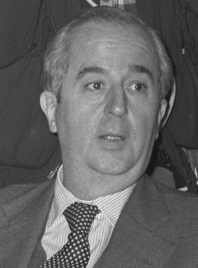Édouard Balladur
Friday, May 2, 2025
Balladur was born in Izmir, Turkey, to an Armenian family with five children and long-standing ties to France. His family emigrated to Marseille in 1930s.
In 1957, Balladur married Marie-Josèphe Delacour, with whom he had four sons.
Balladur started his political career in 1964 as an advisor to Prime Minister Georges Pompidou. After Pompidou's election as President of France in 1969, Balladur was appointed under-secretary general of the presidency then secretary general from 1973 to Georges Pompidou's death in 1974.
He returned to politics in the 1980s as a supporter of Jacques Chirac. A member of the Neo-Gaullist Rally for the Republic (RPR) party, he was the theoretician behind the "cohabitation government" from 1986 to 1988, explaining that if the right won the legislative election, it could govern with Chirac as Prime Minister without Socialist Party President François Mitterrand's resignation. As Minister of Economy and Finance, he sold off a large number of public companies and abolished the wealth tax. He appeared as an unofficial deputy Prime Minister in the cabinet led by Chirac. He took a major part in the adoption of liberal and pro-European policies by Chirac and the RPR. After Chirac's defeat at the 1988 presidential election, a part of the RPR held him responsible of the abandonment of Gaullist doctrine but he kept the confidence of Chirac.
When the RPR/UDF coalition won the 1993 legislative election, Chirac declined to become Prime Minister again in a second "cohabitation" with President Mitterrand, and Balladur became Prime Minister. He was faced with a difficult economic situation but he did not want to make the political errors of the previous cohabitation government. If he failed to impose his project of minimum income for youth, he led a moderate liberal policy in economy. Conveying the image of a quiet conservative, he did not question the wealth tax (reestablished by the Socialists in 1988). Despite corruption affairs affecting some of his ministers, who he forced to resign (thus lending his name to the so-called "Balladur jurisprudence"), he became very popular and had the support of influential media.
When he became Prime Minister, Balladur had promised Chirac that he would not enter the 1995 presidential election, and that he would support Chirac's candidacy. However a number of right-wing politicians advised Balladur to run for the presidency in 1995. He went back on his promise to Chirac and entered the campaign. When he announced his candidacy, four months before the election, he was considered the favourite. In the polls, he led Chirac by almost 20 points. However from the position of an outsider, Chirac criticized Balladur as representing "dominant ideas", and the difference between the two decreased quickly. The revelation of a bugging scandal which implicated Balladur also contributed to a drop in his popularity among voters.
In the first round of the election, Balladur finished in third place with 18.6% of the vote behind the Socialist candidate Lionel Jospin and Chirac. He was thus eliminated from the final run-off election between the top two candidates which Chirac won.
Chirac immediately appointed Alain Juppé to replace Balladur as Prime Minister. Despite Chirac declaring that he and Balladur had been "friends for 30 years", Balladur's decision to stand against him greatly strained their relationship. As a result, the "Balladuriens" who had supported him in the presidential election (such as Nicolas Sarkozy) were ostracized from the new Chirac administration.





